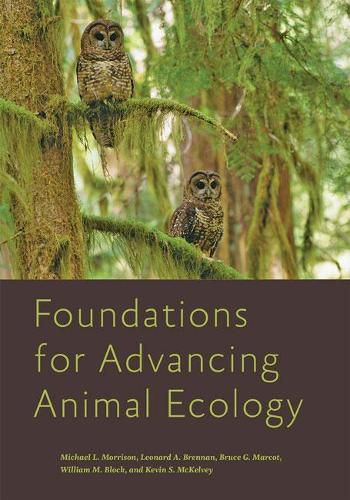Readings Newsletter
Become a Readings Member to make your shopping experience even easier.
Sign in or sign up for free!
You’re not far away from qualifying for FREE standard shipping within Australia
You’ve qualified for FREE standard shipping within Australia
The cart is loading…






A look at how wildlife professionals can modernize their approaches to habitat and population management with a fresh take on animal ecology.
How can we maximize the probability that a species of wild animal will persist into the future? This audacious book proposes that advancing animal ecology-and conservation itself-demands that we reenvision our basic understanding of how animals interact with their environments and with each other.
Synthesizing where we are and where we need to go with our studies of animals and their environs, Foundations for Advancing Animal Ecology asserts that studies of animal ecology should begin with a focus on the behaviors and characteristics of individual organisms. The book examines
* the limitations of classic approaches to the study of animal ecology * how organisms organize into collections, such as breeding pairs, flocks, and herds * how the broader biotic and abiotic environment shapes animal populations, communities, and ecosystems * factors underlying the distribution and abundance of species through space and time * the links between habitat and population * why communication between researchers and managers is key * specific strategies for managing wild animal populations and habitats in an evolutionary and ecosystem context
Throughout, the authors stress the importance of speaking a common and well-defined language. Avoiding vague and misleading terminology, they argue, will help ecologists translate science into meaningful and lasting actions in the environment. Taking the perspective of the organism of interest in developing concepts and applications, the authors always keep the potentially biased human perspective in focus.
A major advancement in understanding the factors underlying wildlife-habitat relationships, Foundations for Advancing Animal Ecology will be an invaluable resource to professionals and practitioners in natural resource management in public and private sectors, including state and federal agencies, non-governmental organizations, and environmental consultants.
$9.00 standard shipping within Australia
FREE standard shipping within Australia for orders over $100.00
Express & International shipping calculated at checkout
A look at how wildlife professionals can modernize their approaches to habitat and population management with a fresh take on animal ecology.
How can we maximize the probability that a species of wild animal will persist into the future? This audacious book proposes that advancing animal ecology-and conservation itself-demands that we reenvision our basic understanding of how animals interact with their environments and with each other.
Synthesizing where we are and where we need to go with our studies of animals and their environs, Foundations for Advancing Animal Ecology asserts that studies of animal ecology should begin with a focus on the behaviors and characteristics of individual organisms. The book examines
* the limitations of classic approaches to the study of animal ecology * how organisms organize into collections, such as breeding pairs, flocks, and herds * how the broader biotic and abiotic environment shapes animal populations, communities, and ecosystems * factors underlying the distribution and abundance of species through space and time * the links between habitat and population * why communication between researchers and managers is key * specific strategies for managing wild animal populations and habitats in an evolutionary and ecosystem context
Throughout, the authors stress the importance of speaking a common and well-defined language. Avoiding vague and misleading terminology, they argue, will help ecologists translate science into meaningful and lasting actions in the environment. Taking the perspective of the organism of interest in developing concepts and applications, the authors always keep the potentially biased human perspective in focus.
A major advancement in understanding the factors underlying wildlife-habitat relationships, Foundations for Advancing Animal Ecology will be an invaluable resource to professionals and practitioners in natural resource management in public and private sectors, including state and federal agencies, non-governmental organizations, and environmental consultants.